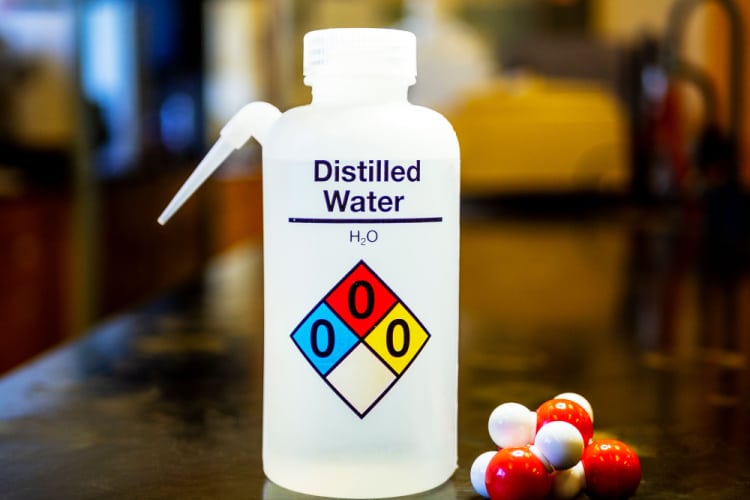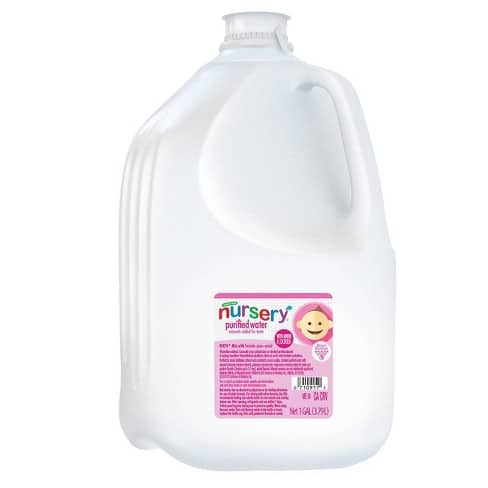As a new parent, you’ve probably been told to use nursery, distilled or tap water in making baby formula. While this is true, the American Academy of Pediatrics recommends contaminant-free tap water as the best water for baby formula. They suggest boiling and letting the water cool for 5-mins before mixing it with baby formula.
If your tap water isn’t contaminant free, you can then consider using either nursery or distilled water. Both options have their pros & cons which we’ll discuss in this article.
What is Distilled Water?
Distilled water is purified water gotten through distillation.
Distillation is a water purification process that involves boiling and vaporizing water to remove inorganic compounds and particulates. The purified vapor is then cooled to obtain pure water.

While distillation is very effective at purifying water, the water loses 99.9% of healthy minerals such as sodium, calcium and magnesium. The water can still be used to make baby formula after 6-months of breastfeeding, however, the lack of minerals could cause mineral deficiency and electrolyte imbalance in your baby.
What is Nursery Water?
Nursery Water is a brand of bottled water for babies and infants. It is distilled water that contains trace amounts of healthy minerals like magnesium, potassium, calcium, and, depending on the product, fluoride.
Nursery water is treated in four stages:
- The water is processed through an activated carbon filter to separate volatile organic compounds (VOCs), chlorine, and other organic parts from the water
- It is then distilled to remove contaminants
- Next, the water is ozonated to eliminate all the leftover bacteria and viruses
- It is then pushed through a 1-micron filter to eliminate remaining bacteria and cysts

Nursery water sells two products: one with fluoride and one without fluoride. The following sections will explain the distinction between them in relation to distilled water.
What is the Difference Between Nursery and Distilled Water?
The main difference between Nursery water and regular distilled water is the lack of minerals in distilled water. Nursery Water is basically distilled water with extra minerals. These minerals are naturally present in tap water but are removed during the distillation process.
Magnesium Potassium and Calcium
These minerals are beneficial for your baby. However, Nursery Water products contain only trace amounts of magnesium, potassium, and calcium to improve the taste.
The brand doesn’t advertise the exact amount of minerals they add to their bottled water which makes it difficult to know if the minerals are sufficient for your baby’s needs.
Fluoride
The presence of fluoride is a hot topic in the baby water market and has become a concern for many parents in their choice of baby water. So what’s the deal with fluoride?
Fluoride has been present in public water in the USA since the 1950s due to tap water fluoridation. The practice was started in order to improve the dental health of the population. It was found that applying fluoride on the exterior or the top of the teeth helps prevent decay and cavities and strengthens the teeth’ enamel.
With the general improvement of dental health and hygiene standards, many countries stopped fluoridating tap water, but it is still practiced in the USA.
But since it’s naturally present in public water, it should be safe for babies, right? Well, yes, but with a caveat. According to the CDC, some baby formulas already contain low levels of fluoride, and regularly mixing them with fluoridated water can lead to mild fluorosis.
Excess fluoride consumption is known to cause health implications such as permanent discoloration of the teeth, enamel streaking, and most importantly, skeletal fluorosis – bones becoming brittle and prone to breakage.
According to The Department of Health and Human Services (HHS), the optimal fluoride concentration in drinking water is 0.7 mg/L or 0.7 ppm. Fluoridated Nursery Water contains 0.7 ppm fluoride.
Is Nursery Water Without Fluoride?
There are two types of Nursery Water on the market:
- Non-Fluoridated Nursery Distilled Water: Distilled water with trace amounts of magnesium, potassium, and calcium added for taste.
- Fluoridated Nursery Water: Distilled water with fluoride (0.7ppm) and trace amounts of magnesium, potassium, and calcium added for taste.
Both products are distilled water but if you’re concerned about excess fluoride consumption, we recommend that you go with the non-fluoridated option.
Nursery vs Distilled Water: Which One Is Best for Babies?
We recommend occasionally using distilled water for babies due to the lack of minerals and electrolytes necessary for a baby’s health. Nursery water is a better option since it is basically distilled water with added minerals.
Fluoridated Nursery Water contains 0.7ppm of fluoride, the optimal fluoride level advised by the US Health Department.
In theory, both the fluoridated and non-fluoridated versions of Nursery Water are preferable to distilled water thanks to the added minerals. However, it’s best to consult your pediatrician before using either of them for your baby formula.

Distilled water jugs do not say refrigerate after opening, whereas, the nursery water does. Is this really necessary or just a precaution?
Hi Cinthia, it’s a precaution. There isn’t a special reason for what is in nursery water that requires refrigeration. It’s mainly a hygiene practice for nursing situations.
Hi Why is the lack of minerals a concern in a distilled water wheb the formula should contain the sufficient amount?